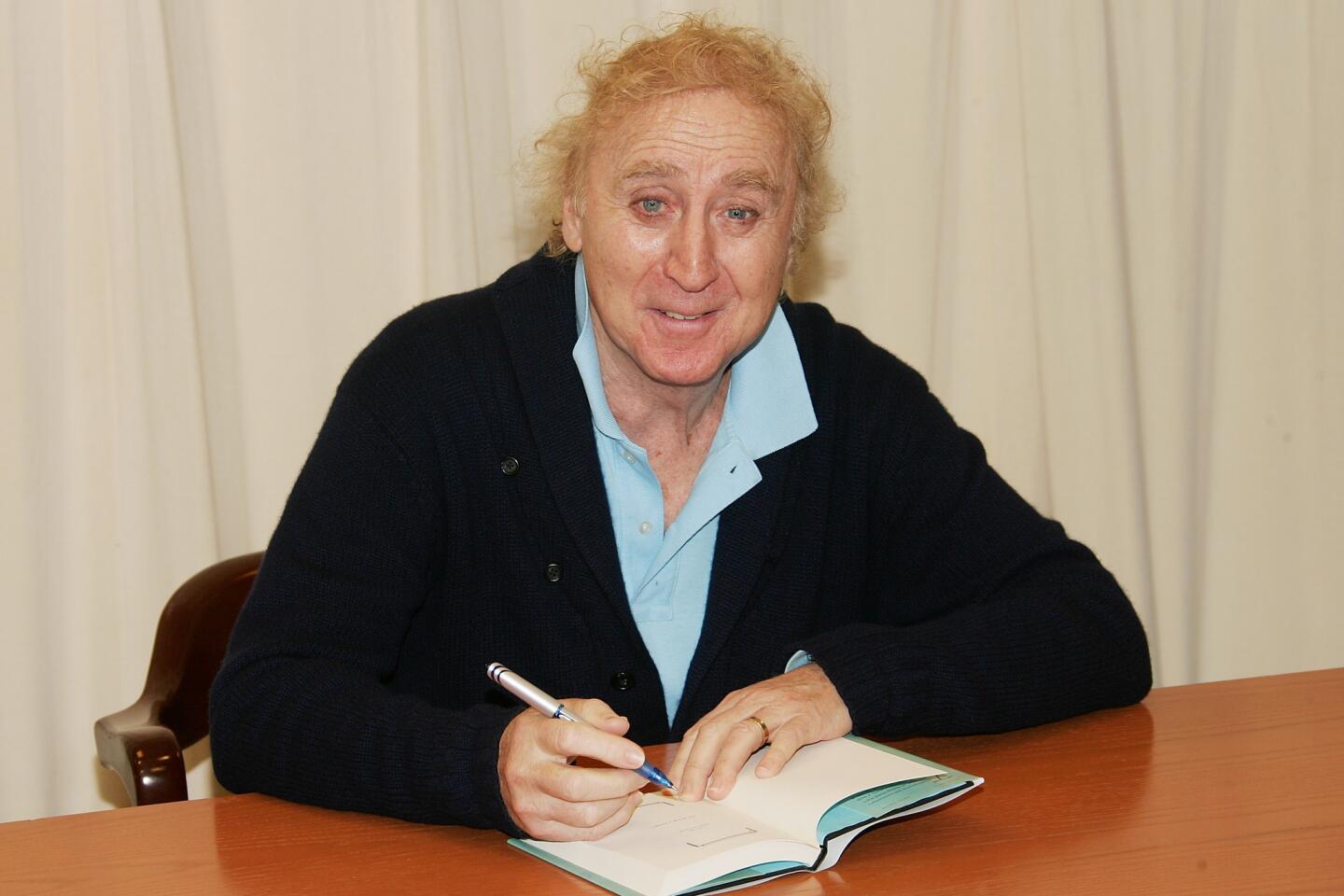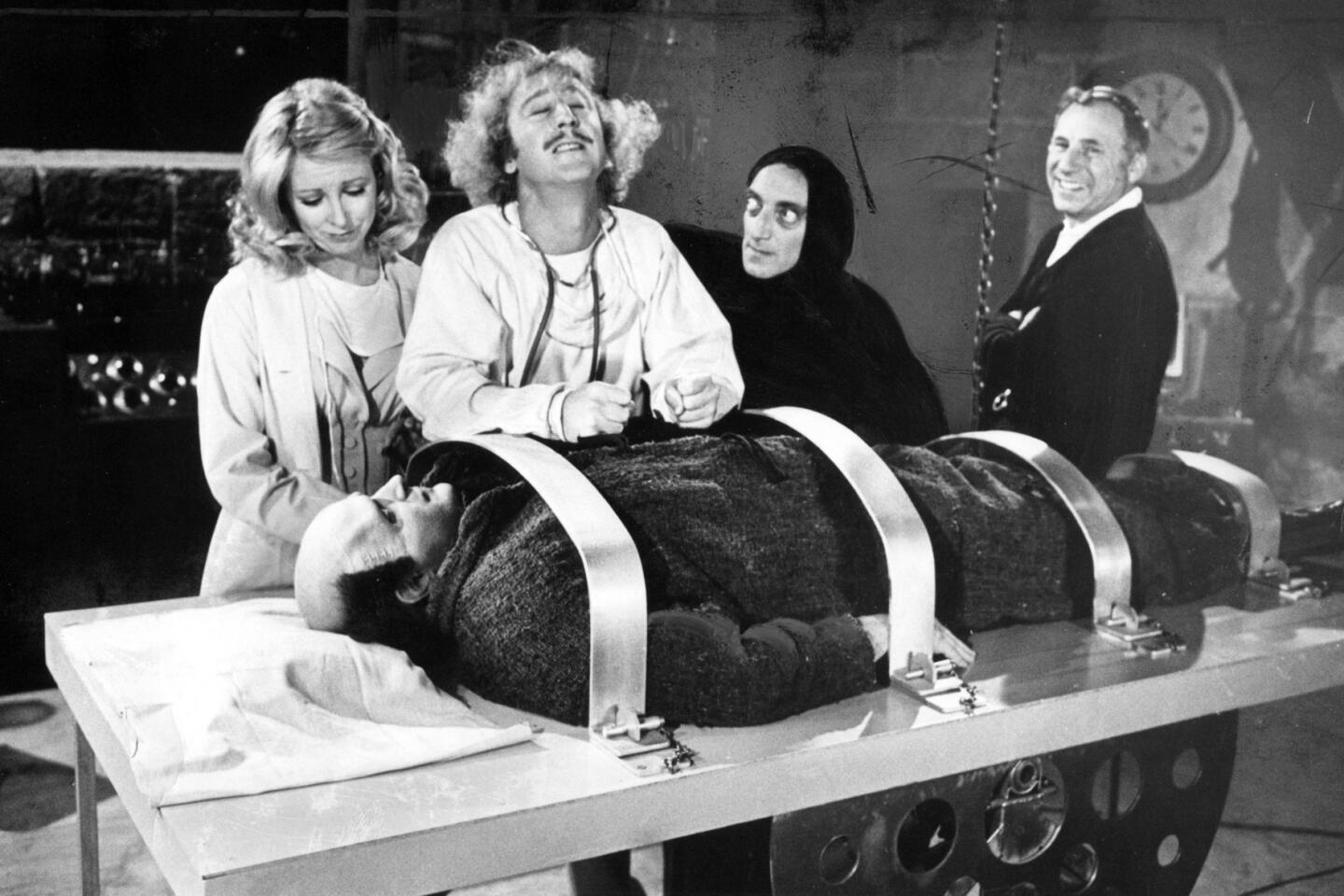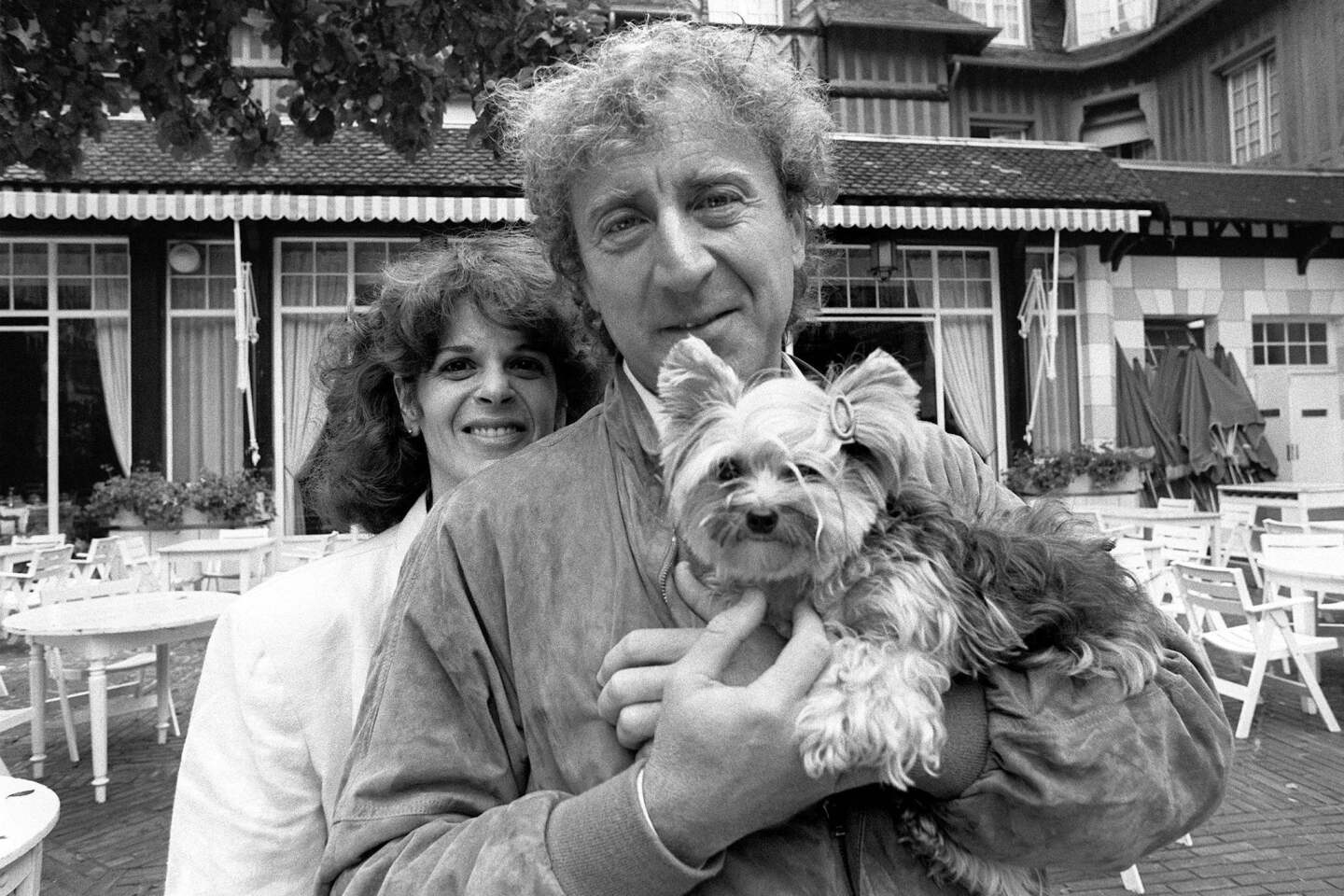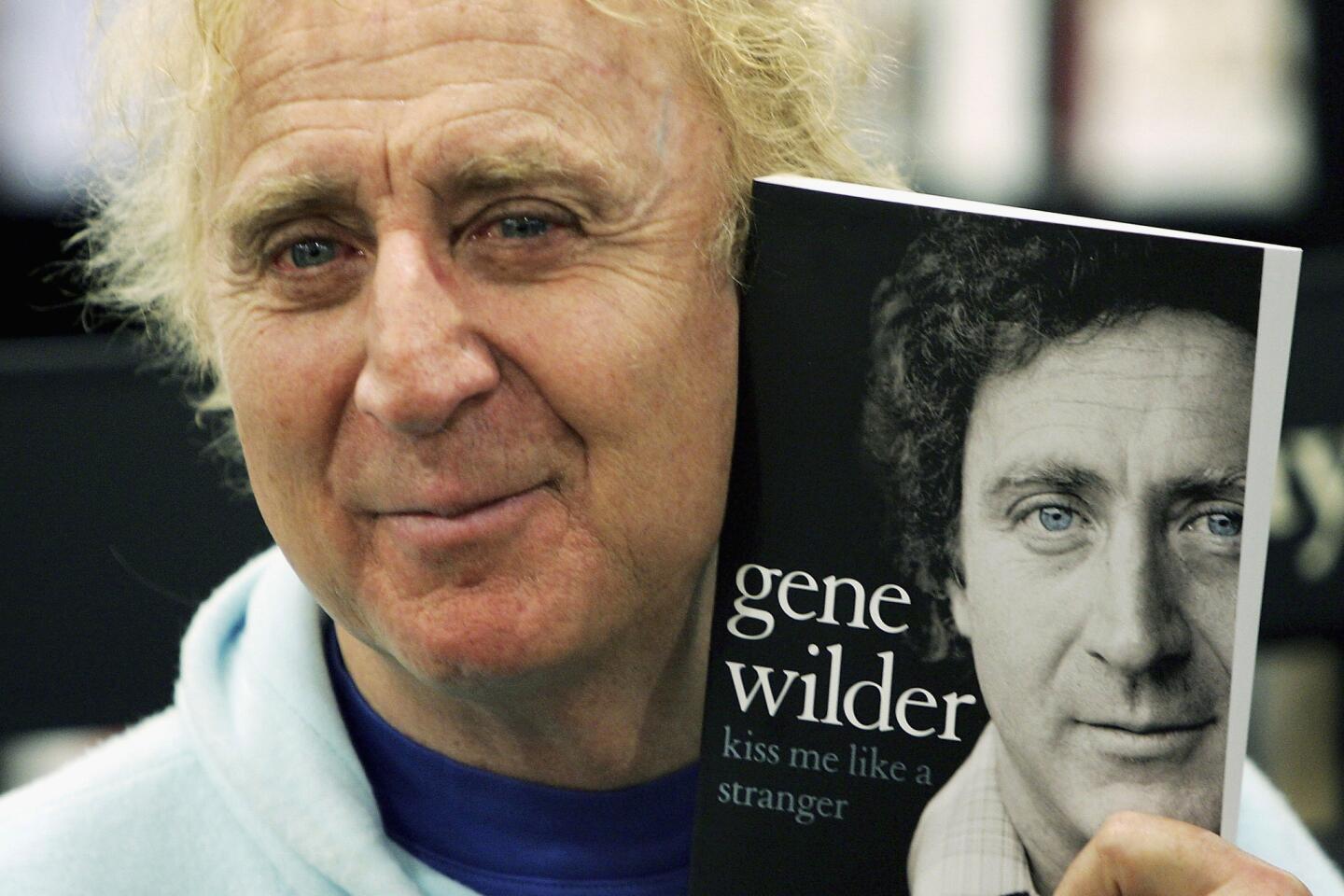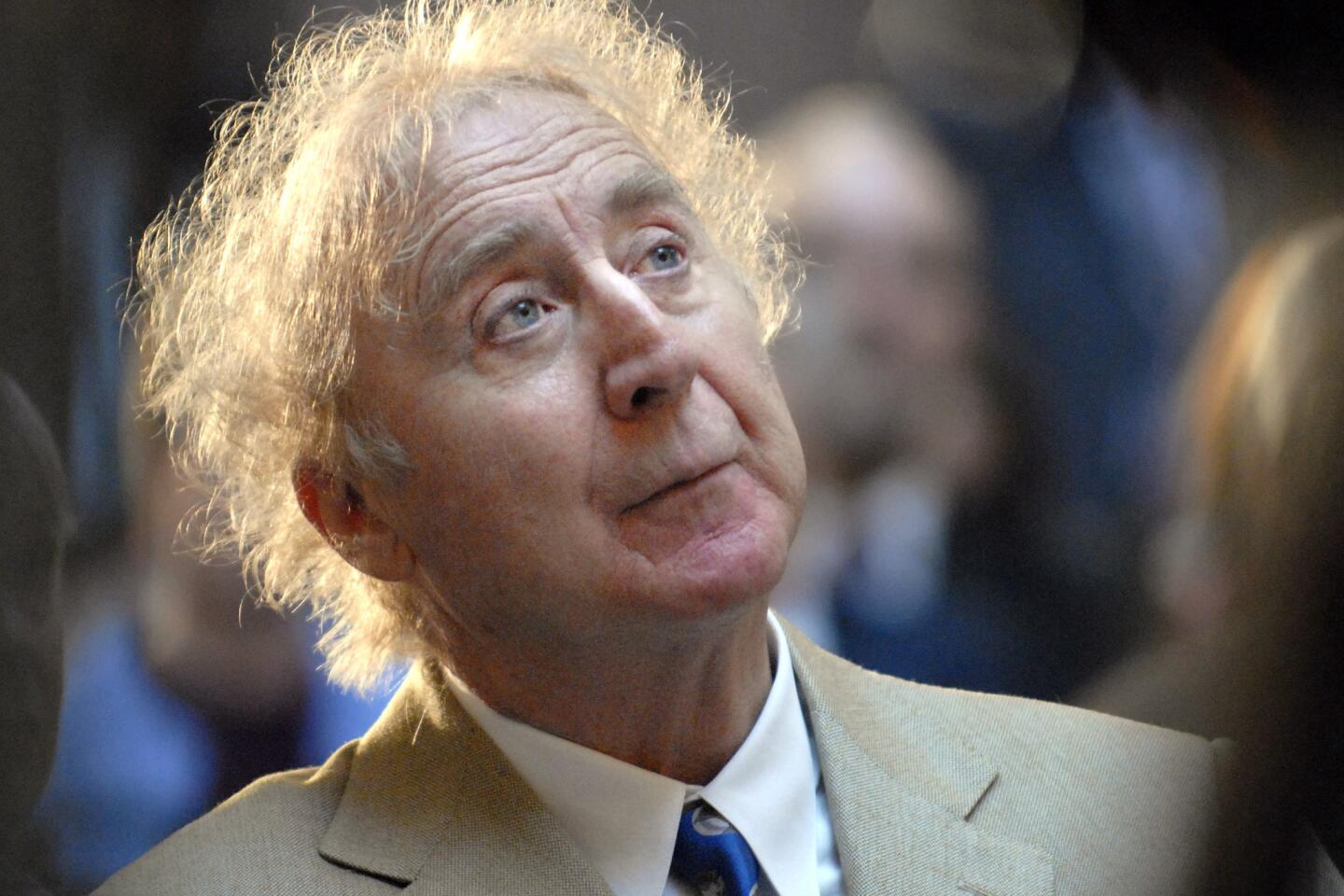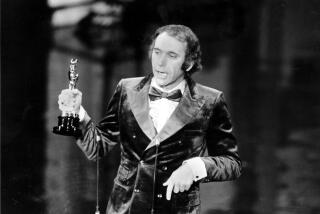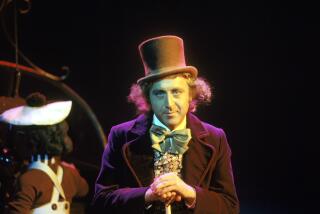Gene Wilder dies at 83; ‘Willy Wonka’ star and Mel Brooks collaborator
- Share via
In 1963, Gene Wilder was starring alongside Anne Bancroft in one of his first major stage roles, a Broadway production of “Mother Courage and Her Children,” when he met a man who would forever change the course of his career: Bancroft’s future husband, Mel Brooks.
Five years later, Brooks cast Wilder opposite Zero Mostel in his 1968 comedy “The Producers,” the story of a Broadway producer and accountant who hatch a scheme to produce a guaranteed flop called “Springtime for Hitler.”
For the record:
7:31 a.m. March 1, 2025An earlier version of this article incorrectly said Gene Wilder was nominated for an Oscar for best actor for his role in “The Producers.” He was nominated for a best supporting Oscar for “The Producers.” It also said he was born in 1935.
With his turn as the perpetually frazzled Leo Bloom, Wilder created an indelible portrait of comic neurosis and set the stage for two future collaborations with Brooks – “Blazing Saddles” and “Young Frankenstein,” both released in 1974 – that are among the most beloved comedies in Hollywood history.
“If it weren’t for Mel,” Wilder told The Times in 1990, “I’d still be doing temporary typing for a living, and selling toys at FAO Schwarz for $1.40 an hour.”
REVIEW: 1971’s ‘Willy Wonka’ soars sweetly on Gene Wilder’s sly star turn »
A two-time Oscar nominee who brought a unique blend of manic energy and world-weary melancholy to films as varied as 1971’s children’s movie “Willy Wonka & the Chocolate Factory” and the 1980 comedy “Stir Crazy,” Wilder died Sunday of complications from Alzheimer’s disease at his home in Stamford, Conn. He was 83.
A private man who had largely retreated from Hollywood in the last two decades, Wilder had suffered from the disease for three years. In a statement, his nephew Jordan Walker-Pearlman said that the decision not to disclose his condition was not made out of vanity but so that the many children who loved Wilder from his role as the eccentric candy-maker Willy Wonka wouldn’t feel worried or confused. “He simply couldn’t bear the idea of one less smile in the world,” Walker-Pearlman said.
Whether bouncing anxiously off of the explosive Mostel in “The Producers” – for which he earned a best supporting actor Oscar nomination – or parrying jokes with Richard Pryor in one of their four films together, the classically trained Wilder was both a magnetic performer in his own right and an ideal comic foil.

Gene Wilder, a two-time Oscar nominee and comedy star, has passed away at age 83.
On Monday afternoon, Brooks posted a tribute to Wilder on Twitter, calling him “one of the truly great talents of our time. He blessed every film we did with his magic and he blessed me with his friendship.”
But, as great as his gifts for comedy were, Wilder always considered himself an actor rather than some kind of clown. “He never thought of himself as a comedian,” Walker-Pearlman told The Times by phone Monday. “He did occasionally think of himself as a comic actor, but actor first. There were very few things that could hurt his feelings, and one of them was if he was described as a comedian as opposed to an actor.”
As a performer as well as screenwriter and director, Wilder always approached his works from an unexpected angle. When taking on the role of Willy Wonka in director Mel Stuart’s adaptation of Roald Dahl’s “Charlie and the Chocolate Factory,” Wilder insisted the character first appear on screen limping with a cane, then trip and do a somersault with a flourish.
“Mel Stuart said, ‘What do you want to do that for?’ ” Wilder recounted years later in an interview with Larry King. “I said, ‘Because no one will know from that point on whether I’m lying or telling the truth.’ ”
Born Jerome Silberman in Milwaukee on June 11, 1933, Wilder began performing at a young age, eventually studying at the Old Vic Theatre School in Bristol, England, in the mid-1950s. Returning stateside, in 1956 he was inducted into the Army for a brief stint. In 1961 he became a member of the Actors Studio in New York, studying with Lee Strasberg, and adopted the stage name Gene Wilder.
Wilder made his movie debut in Arthur Penn’s landmark 1967 film “Bonnie and Clyde” as an undertaker taken hostage by the notorious depression outlaws Clyde Barrow and Bonnie Parker. But it was his turn a year later in “The Producers” that brought him stardom, cementing a relationship with Brooks that would yield some of his most memorable performances.
A gleefully offensive homage to – and parody of — the Hollywood western, “Blazing Saddles” saw Wilder play an alcoholic gunslinger who teams up with a small town’s black sheriff against cutthroat landgrabbers. In “Young Frankenstein” – for which Wilder shared an Oscar nomination with Brooks for their screenplay – he portrayed young surgeon Frederick Frankenstein, who, in an attempt to distance himself from his notorious grandfather, insists that his surname is pronounced “Frahnkensteen.”
Hot off his work with Brooks, Wilder stepped out on his own as a director with 1975’s “The Adventure of Sherlock Holmes’ Smarter Brother,” in which he also wrote and starred. He also directed and starred in 1977’s “The World’s Greatest Lover,” 1984’s “The Woman in Red” and 1986’s “Haunted Honeymoon.”
Wilder also enjoyed a highly successful, if seemingly improbable, onscreen partnership with Pryor. The two first appeared together in 1976’s “Silver Streak,” but it was the box-office smash of “Stir Crazy,” in which they played a pair of men who are wrongfully imprisoned, that cemented their dynamic. The two later appeared together in 1989’s “See No Evil, Hear No Evil” and 1991’s “Another You.”
Wilder’s first two marriages, to Mary Mercier and Mary Joan Schutz, ended in divorce. While making the comedy “Hanky Panky” in 1982, he met former “Saturday Night Live” star and actor Gilda Radner. The two married in 1984 and remained together until Radner’s death from ovarian cancer in 1989.
Around the time of Radner’s death, Wilder began to gradually downshift his acting career. In 1994, he starred in the short-lived sitcom “Something Wilder” and in 2003 he won an Emmy Award for a guest-starring turn in NBC’s “Will & Grace.”
Although fans who’d grown up on his films of the 1970s may have yearned to see him return to the big screen, Wilder found increasingly little appeal in the kinds of comedies Hollywood turned out, which to his mind too often stressed profanity over genuine humor.
“Even if the plot sounds interesting, the script is terrible,” he told The Times in 2008. “That’s why I’m not doing movies.”
Wilder is survived by his fourth wife, Karen, whom he married in 1991, and other relatives.
Throughout his career, even in his most wildly antic performances, Wilder’s comedy was often tinged with an undeniable undercurrent of sadness that he had seemed to carry with him from a young age and that he shared with one of his comic heroes, Charlie Chaplin.
But, as he explained to The Times in 1977, what saved him from his darkest self was his unfailing ability to tap into an imaginative streak of comic insanity that also ran deep inside him.
“That I will probably have until the day I die, and that’s probably why people pay money to see me,” he said. “So I’d be insane to lose my insanity.”
ALSO:
Hollywood mourns the loss of comedy legend Gene Wilder
From the Archives: Gene Wilder on his first turn as a romantic lead in ‘Funny About Love’
From the Archives: A charming, witty introduction to a ‘Stranger’ a la Gene Wilder
From the Archives: Gene Wilder discusses his acting successes and preference for writing
UPDATES:
5:45 p.m.: This story was updated with quotes from Gene Wilder’s nephew and archived interviews with the actor-comedian.
4:20 p.m.: This story has been updated throughout.
1:55 p.m.: This story was updated with a statement from Gene Wilder’s nephew and a quote from Mel Brooks.
This story was originally published at 12:45 p.m.
More to Read
Only good movies
Get the Indie Focus newsletter, Mark Olsen's weekly guide to the world of cinema.
You may occasionally receive promotional content from the Los Angeles Times.
